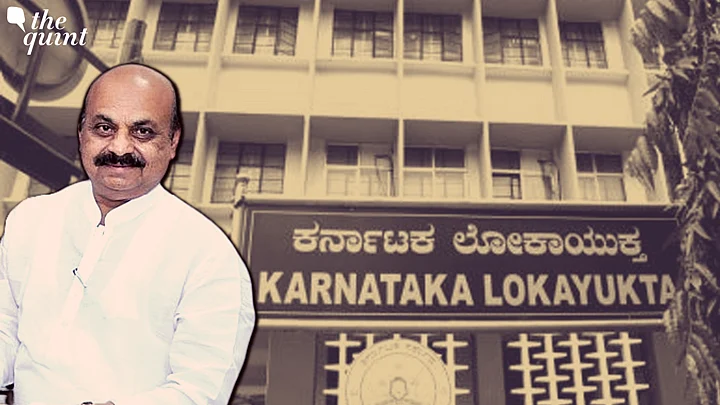With the arrest of the son of a Bharatiya Janata Party (BJP) MLA, who was allegedly caught red-handed while accepting a bribe of Rs 40 lakh on behalf of his father, it seems the Karnataka Lokayukta is on track to its old glorious days.
Established in 1984, the Karnataka Lokayukta was formed to investigate and report on corruption in the state government and to redress public grievances. However, the quasi-judicial body has seen several upheavals in the past, with the ruling government wanting to keep it at bay.
With the Assembly Elections just weeks away, the anti-corruption wing of the Lokayukta is back in the limelight after conducting raids at the residence of Prashanth Madal and discovering over Rs 8 crore in unaccounted-for cash.
But apart from the one-off good job, where does the body stand today? Why was it dismissed for six years until 2022? Can CM Bommai take credit for its revival? We explain.
CM Bommai Takes Credit for ‘Restarting’ Lokayukta
Lokayukta officers on Thursday, 2 March, caught and arrested the son of BJP MLA Madal Virupakshappa - Prashanth Madal, while he was allegedly receiving a bribe of Rs 40 lakh.
Prashanth, a Karnataka Administrative Service (KAS) officer, is the chief accountant of Bangalore Water Supply and Sewerage Board (BWSSB).
The Lokayukta arrested Prashanth while he was allegedly receiving the bribe on behalf of his father, who is also the Chairman of Karnataka Soaps and Detergents Limited (KSDL), which makes the brand 'Mysore Sandal Soap'.
On Friday, as the investigations continued, nearly Rs 6 crore, was found in unaccounted-for cash at the residence of Prashant Madal.
With the news triggering the opposition to demand CM Basavaraj Bommai's resignation, the chief minister was quick to blame the Congress party and take credit for "restarting" the Lokayukta. But is that the truth?
'Congress & BJP Have Both Taken Opposing Stands': Former Lokayukta
Speaking to The Quint, Justice Santosh Hegde, who was the Karnataka Lokayukta from 2006 to 2011, said, "In 2011, I as Lokayukta gave a mining report (that disturbed BS Yediyurappa's image). That report was not accepted or implemented by the then BJP government. At that time, Congress was in the opposition, headed by Siddaramaiah. They protested against the non-implementation of the report and marched from Bangalore to Bellari. But the BJP still didn’t implement it."
However, when there was a change in the ruling dispensation and the Congress came to power, it did not implement the report either, Hegde said. A year later, the Karnataka High Court had given relief to Yediyurappa and quashed a portion of the report.
While the ruling government has a history on non-cooperation with the independent body, what exactly are its powers:
The Lokayukta has the power to investigate cases in relation to the Chief Minister, all other Ministers and Members of the State Legislature and all state government employees.
The body, through the Bureau of Investigation, its police wing, had derived its investigating powers from the Prevention of Corruption Act, 1988.
The Six-Year-Long Dormancy
In 2016, the Lokayukta was stripped of its investigative powers before transferring them to the Anti-Corruption Bureau (ACB) of Karnataka Police directly under Chief Minister of Karnataka Siddaramaiah.
Explaining how one of the major powers of the Lokayukta (fighting corruption through Lokayukta Police) was taken away, Hegde said, "He took the second power away, saying that it has not been functioning efficiently. Inspite of the fact that the body had given a report against three CMs, eight ministers, and 150 officers in just one mining report – apart from other actions against individual officers."
The ACB however is another police organisation that comes under the state Home Minister and Chief Minister - it is not independent, he added.
While the former Solictor General of India agreed that the ACB helped close corruption cases against big persons, he questioned why the BJP did not dismiss Siddaramaiah's creation even after coming to power.
"In fact, it was mentioned in their election manifesto that they will dismiss the ACB within 24 hours of coming power. Yediyurappa went on to say that the ACB was doing a good job."
Stating that CM Bommai taking credit for the dismissal of the ACB is inaccurate, Hegde said, "It was the Karnataka High Court that had given the Lokayukta its powers back." Notably, the case for the ACB's dismissal was filed in 2016 by the Advocates Association of Bengaluru, the Samaj Parivartana Samudaya, and advocate Chidananda Urs, and not the BJP.
Finally in August 2022, a bench of Justices B Veerappa and KS Hemalekha ordered abolishing the state government-controlled ACB police and revival of the anti-corruption police unit attached to the Karnataka Lokayukta.
While it has done a "good job" as per Hegde, by even going against the ruling government, as per Right to Information (RTI) activist Adarsh Iyer, the body still suffers non-cooperation from the government and the lack of "adequate staff" to dispose of complaints quickly.
Now though the body is back in action, it remains to be seen if it will continue functioning efficiently and independently.
(At The Quint, we question everything. Play an active role in shaping our journalism by becoming a member today.)
